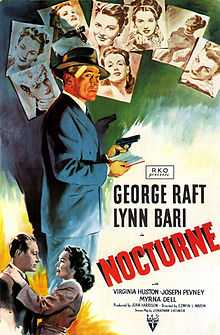Nocturne (film)
| Nocturne | |
|---|---|
 Theatrical release poster | |
| Directed by | Edwin L. Marin |
| Produced by | Joan Harrison |
| Screenplay by | Jonathan Latimer |
| Story by |
Roland Brown Frank Fenton |
| Starring |
George Raft Lynn Bari Virginia Huston Joseph Pevney |
| Music by | Leigh Harline |
| Cinematography | Harry J. Wild |
| Editing by | Elmo Williams |
| Distributed by | RKO Pictures |
| Release dates |
|
| Running time | 87 minutes |
| Country | United States |
| Language | English |
Nocturne is a 1946 black-and-white film noir starring George Raft and Lynn Bari. The film was produced by longtime Alfred Hitchcock associate Joan Harrison, scripted by Jonathan Latimer, and directed by Edwin L. Marin.[1]
Plot
A Hollywood film composer is found dead. The police think it is suicide but a cop, Joe Warne (Raft), suspects murder. Warne begins looking for "Dolores," a name in a song by the dead man. While investigating, Warne finds out the dead man has had a list of models as girlfriends and that ten of them have a motive for the suspected murder.
His ruthless questioning tactics lead to several suspects reporting him for abuse. Pursuing the case with dogged determination, the obsessed Warne is eventually suspended from the police force while on the case. As he digs deeper into the case, the clues draw him closer to Frances Ransom (Bari), who may be involved in the killing.
Cast
- George Raft as Joe Warne
- Lynn Bari as Frances Ransom
- Virginia Huston as Carol Page
- Joseph Pevney as Ned "Fingers" Ford
- Myrna Dell as Susan Flanders
- Edward Ashley as Keith Vincent
- Walter Sande as Police Lt. Halberson
- Mabel Paige as Mrs. Warne
- Bern Hoffman as Erik Torp
- Queenie Smith as Queenie, Nora's Roommate
- Mack Gray as Gratz
- Uncredited actors include Filipino Hollywood actor Rudy Robles as Eujemio.
Production
Jane Greer was up for the female lead but George Raft went for the better known Lynn Bari.[2]
Reception
Box Office
The film was popular on release and recorded a profit of $568,000.[3]
Critical response
When the film was released, the staff at Variety magazine discussed the acting in the drama and wrote "Nocturne is a detective thriller with action and suspense plentiful and hard-bitten mood of story sustained by Edwin L. Marin's direction. There's some confusion towards windup in pulling all threads of tale together but this was apparently due to editing problem in keeping footage to tight 86 minutes running time. George Raft is seen as hardboiled detective lieutenant whose stubbornness leads to uncovering a murder previously tagged a suicide. He gives his usual, slow-paced, tough touch to assignment to make it thoroughly effective. Co-star Lynn Bari, a prime suspect through much of the footage, turns in a capable job. Virginia Huston is interesting as Bari's songstress sister and sings three tunes."[4]
Film critic Dennis Schwartz called the film, "A low rent version of the film noir Laura," and added, "It was a snappy film that makes the most of its murder investigation with insightful looks at the lives of those on the fringe associated with Hollywood. The viewer is taken on a tour of 1940s styled nightclubs, different income styles of living quarters, and into the RKO studio lot, as the tough guy Raft lives on the job vicariously through others. It's a film with many ironies. It was scripted by Jonathan Latimer and directed by Edwin Marin, and it was produced by longtime Alfred Hitchcock associate Joan Harrison."[5]
References
- ↑ Nocturne at the American Film Institute Catalog.
- ↑ Everett Aaker, The Films of George Raft, McFarland & Company, 2013 p 124.
- ↑ Richard Jewell & Vernon Harbin, The RKO Story. New Rochelle, New York: Arlington House, 1982. p216.
- ↑ Variety. Sattf film review, 1946. Accessed: August 6, 2013.
- ↑ Schwartz, Dennis. Ozus' World Movie Reviews, film review, March 12, 2002. Accessed: August 6, 2013.
External links
- Nocturne at the American Film Institute Catalog
- Nocturne at the Internet Movie Database
- Nocturne at allmovie
- Nocturne at the TCM Movie Database
- Nocturne film scene at YouTube
| |||||